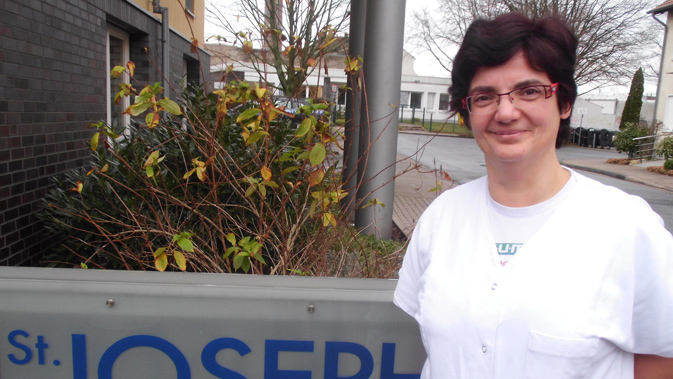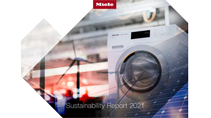Press releases
'Fast, quiet and easy to use: We recommend Miele's new fresh water dishwashers'
Gütersloh/Hanover, March 25, 2014
No. 012/2014

Interview with Inge Ostrowski, head of housekeeping, and Miele product manager Eike Lutz Kellermeier
Since November 2013, Miele has been offering new fresh water dishwashers for use on care wards. These machines are currently being put through their paces in the field and the time has come for a first interim report. The persons involved are Eike Lutz Kellermeier, chief product manager at Miele for commercial dishwashing systems, and Inge Ostrowski, head of housekeeping at the St. Joseph care and nursing home in Bielefeld, where a new fresh water dishwasher has been undergoing field trials for just under one year.
How did the official market launch go some four months ago?
Eike Lutz Kellermeier: It was a huge success! The feedback from customers has been positive across the board and very specific. From nursing homes, for instance, we have been hearing that users are particularly pleased with the high standards of hygiene achieved by Miele Professional's fresh water system.
Inge Ostrowski: Yes, I can put my name to that! A Miele fresh water dishwasher is in use in each of our five residential units, but only the most recent model bears the name 'HygienePlus'. Everyone who has worked with this machine is thrilled: It is simple to operate, very quiet and, above all, features a thermal disinfection programme. This offers a huge advantage at the moment as we have a case with a bacterial infection on our hands. As a precautionary measure, we wash the dishes used by this person immediately after use. Besides that, we always run a disinfection programme in the evening when we clean the bins used to collect compost and waste food.
How do the new models differ from the previous generation?
Kellermeier: On the new fresh water dishwashers, the capacity on both rack levels has been increased, allowing 50% more crockery to be washed per hour. And all that combined with excellent cleaning results and reduced consumption. On the 'Hygiene' and 'HygienePlus' models, which are of particular interest to nursing homes, the combination of fresh water system and programmes with high final rinse temperatures and corresponding holding times result in hygienic results. And, not least, these machines blend in perfectly in fitted kitchen cabinetry. And that can hardly be said of any other commercial dishwasher!
Ostrowski: Our new machine replaced one which was at least 10 years old. Whenever we opened the door on the old model, clouds of steam billowed out. That is now a thing of the past. And we have also been able to reorganise our daily routine. In the past we had to wait before starting events in the dining room next door until the dishwasher had finished on account of noise levels. Today's machine is much quieter in operation and does not interfere with staff reading to residents next door. And as the dishwasher gets through its work faster, it does not need to be switched on overnight. That's why we would not hesitate a moment in recommending this machine.
Why is it worthwhile investing in new dishwashing technology?
Ostrowski: For us, it makes sense for the simple reason that we are running 8 to 10 cycles a day in each of our residential units. Each unit is home to at least 14, but usually 17 or 18 residents, and each requires a fresh supply of crockery several times a day - and not only at mealtimes. Sometimes, those in our care arrive back late from the doctor's after lunch has finished or some develop an appetite during the night. Dishwashers on each ward ensure that we can do the dishes whenever convenient. And then it is also good if dishwashing is fast and so quiet that no-one is disturbed.
Kellermeier: As a rule, new technology requires less water and electricity than outgoing models. The new fresh water dishwashers sport considerably reduced consumption levels, allowing operating costs to be reduced significantly.
As a rule, the dishwasher is operated by whoever has the time. Is that possible with the new models?
Ostrowski: All the persons who operate the machine were given brief instructions by Miele Service – not least because no-one now needs to open the machine when a programme has finished. That's all automatic now and
this was the biggest difference compared with the old machine. And, what's more, operation is extremely simple. Most of all, we use the 'Short', 'Universal' and 'HygienePlus' programmes which are all easy to locate. All we need to do is to press button 1, 2 or 3 and switch on the dishwasher.
Kellermeier: These direct-access buttons can be used to save the most important programmes and the large display simplifies the user interface experience. All reminders – for example to replenish salt – are displayed in plain text. And, naturally, the display language is easy to change. In short, our fresh water dishwashers are child's play to operate.
Do you have any tips on speeding up the dishwashing process?
Kellermeier: Commercial dishwashers operating on the fresh water principle are in many cases more economical than tank dishwashers. Our recommendation is only to go for a tank machine if you are doing more than 40 cycles per day.
Ostrowski: Wherever possible, food residue should not be allowed to dry on. As soon as trolleys arrive back in the kitchen, coarse residue is scraped off and crockery, cutlery and glassware goes straight into the dishwasher. In our residential units, we do what any private household would do: Dirty dishes are placed in the dishwasher as they come; we do not separate glassware from porcelain. It is also important to ensure that crockery and cutlery baskets are properly loaded. If, say, plates face the centre of the basket, dirt doesn't stand a chance.
(972 words, 6.041 characters incl. spaces)
Company profile: Miele is the world's leading manufacturer of premium domestic appliances including cooking, baking and steam-cooking appliances, refrigeration products, coffee makers, dishwashers and laundry and floor care products. This line-up is augmented by dishwashers, washer-extractors and tumble dryers for commercial use as well as washer-disinfectors and sterilisers for use in medical and laboratory applications (Miele Professional). The Miele company, founded in 1899, has 8 production plants in Germany as well as one plant each in Austria, the Czech Republic, China and Romania. 2012/13 turnover amounted to approx. EUR 3.15 bn with sales outside Germany accounting for 70%. Miele is represented with its own sales subsidiaries and via importers in almost 100 countries. Throughout the world, the company, now in fourth-generation ownership, employs a workforce of 17,250, including around two-thirds in Germany. The company headquarters are located in Gütersloh/Westphalia, Germany.
Download as PDF Download incl. media (zip)
Your contact
Anke Schläger
+ 49 5241 89-1949
anke.schlaeger@miele.com
Media information
| Description | Download |
|---|---|
 Inge Ostrowski has been head housekeeper at the St. Joseph's nursing home in Bielefeld for over 18 years.
Inge Ostrowski has been head housekeeper at the St. Joseph's nursing home in Bielefeld for over 18 years.
|
|
| High Resolution JPG | |
 Eike Lutz Kellermeier, Chief Product Manager for commercial dishwashing systems at Miele.
Eike Lutz Kellermeier, Chief Product Manager for commercial dishwashing systems at Miele.
|
|
| High Resolution JPG |


